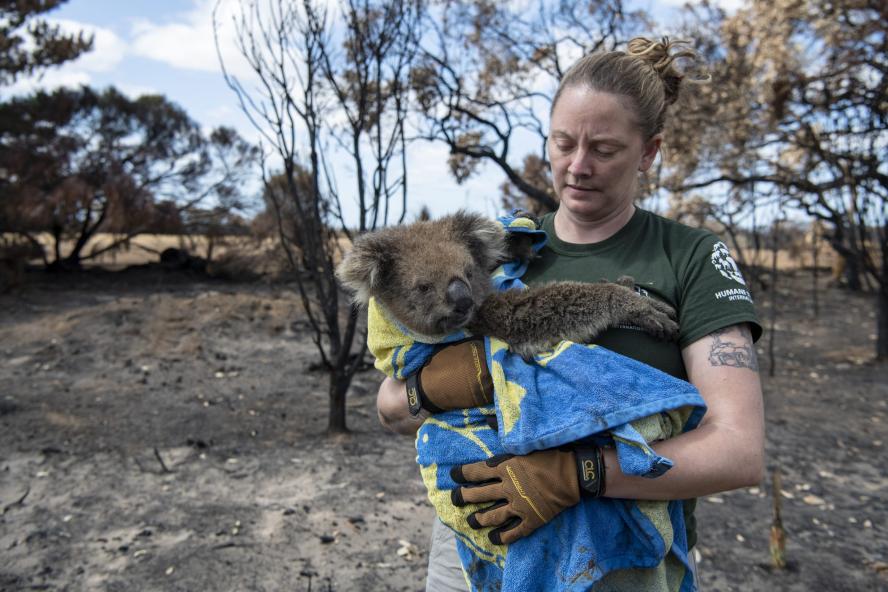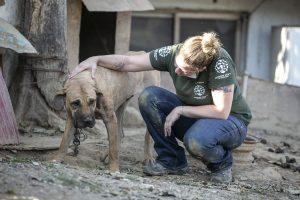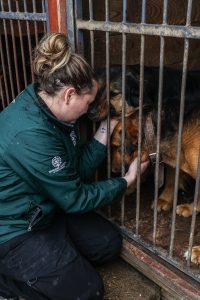-
About
- Leadership & Faculty
- News & Events
-
Academics
- Graduate
- Advanced Clinical Training
- Continuing Education
- Academic Departments
- Academic Offices
- Simulation Experiences
-
Student Life
- Offices
-
Research
-
Hospitals & Clinics
- Emergency Care
- Hospital Services
-
Community Outreach
- Volunteer
Animal Welfare Leader
Kelly Donithan, VG12, directs global animal disaster response for Humane Society International

For as long as she can remember, Kelly Donithan, VG12, has known what she wanted to do: save animals. As director of global animal disaster response for Humane Society International (HSI), she fulfills that calling at locations across the globe.
Donithan developed a reputation as an animal welfare advocate at a young age. “When I was in elementary school the principal would call me out of class to come get a baby bird to take home with me so I could take care of it,” she recalls.
“I started volunteering at animal shelters when I was in sixth grade, but my passion was wildlife conservation, which has ultimately led me to disaster and crisis situations for all kinds of animals.”
A native of Phoenix, Arizona, Donithan earned a B.S. in ecology and evolutionary biology from the University of Arizona. After gaining four years of experience working in animal care at White Oak Conservation Center in Florida, she found the new conservation medicine program at Cummings School of Veterinary Medicine at Tufts University, where she would earn a Master of Science degree.
Cummings School launches her career
“I was excited about the interconnectedness of conservation medicine, how it highlighted One Health, and that progressive approach led me to choose it,” Donithan admits.
While at Cummings School, she conducted a yearlong case study about wildlife trade and disease, learning much about risk factors, safety, and the many concerns from both public health and animal health perspectives.
According to Donithan, the project launched her into a position with the International Fund for Animal Welfare (IFAW), where she worked as a policy analyst before becoming the organization’s wildlife rescue program officer, managing the U.S. Big Cats project.
Her extensive and well-rounded experience include co-founding the Painted Dog Protection Initiative while she was a member of the Emerging Wildlife Conservation Leaders program and moving to Vietnam to serve as bear manager at Animals Asia’s Vietnam Bear Rescue Center. She briefly worked as the exotic pets campaign manager for World Animal Protection prior to joining HSI.
“It was fulfilling to put into place the exotic pet and wild animal trade work that I had researched while I was at Tufts,” Donithan explains, remembering what made her Cummings School experience so valuable. “The faculty, guest speakers, and connections made such a difference. I loved the program and have kept a connection with Tufts and a lot of the students. It’s a unique and incredible program.”
Humane Society International’s extensive reach
At HSI, Donithan oversees the organization’s disaster work around the globe, including the U.S. In addition to disaster response, HSI extends significant effort into mitigation and preparedness management.
“With communities and governments recognizing that our world is becoming increasingly vulnerable we are looking at climate change and its effect on storms and droughts. We work with communities to build up their resilience to disasters, so they are better equipped to withstand the impacts.”
Donithan’s work also includes other initiatives, including oversight of Korean dog meat rescues. “We’ve been working for several years on a campaign in South Korea to close the cat and dog meat trade there. It’s still a country where dogs are consumed, and the only country where they actively farm them.”
While HSI closes an average of two farms each year, as a result approximately 200 dogs are brought to the U.S. and Canada for rehabilitation, placement, and adoption. “Unfortunately, there’s not a culture of adoption in South Korea yet that can take in dogs rescued from the farms,” she notes, explaining that HSI works with the farmers who voluntarily reach out for their support to facilitate a more humane livelihood.
Donithan is also a member of HSI’s recently formed DEI Council, working with colleagues to improve how HSI programs interact with others with respect to diversity, equity, and inclusion.
Vets for Ukrainian Pets
Much of Donithan’s recent work has been focused on Ukraine, where refugees who have fled the war-torn country could access pet food, supplies, and free veterinary care if their funds allow until the need is met throughout Europe thanks to the HSI-sponsored program, Vets for Ukrainian Pets. It was supported by Mars, Incorporated, in collaboration with two European veterinarians and veterinary associations.
“Ukrainian refugees can take their pet to any registered veterinarian in 38 European countries and HSI will cover the cost for veterinary care of up to 250 euros,” Donithan shares, and participating veterinarians can apply for reimbursement of fees.
With offices in Poland and Romania, HSI worked with animal welfare groups in those countries, as well as with UAnimals, the Ukrainian animal protection group, to distribute funds and supplies. “We also established a relationship with the Romanian Red Cross. It’s the first time that we know of where a Red Cross organization has accepted pet care as part of their humanitarian convoys into a war zone,” Donithan contends.
In addition, HSI worked with airlines to cover costs for owners to take their pets with them. “Our main goal is to try to keep families together and keep pet owners with their animals,” she contends. Overall, HSI is addressing all animal needs at refugee centers, as well as any outstanding veterinary needs not addressed by other programs.
Developing mitigation and preparedness strategies
Although reacting to disasters is a primary function of HSI, Donithan hopes the tide is turning. “I believe that developing mitigation and preparedness strategies will save more lives in the long run,” she says. In early May she conducted a disaster and evacuation drill in Guatemala at the base of a volcano, which had erupted the previous year and sent lava within 200 meters of the local community. The need to be prepared for these types of disasters is increasing as extreme weather conditions become more prevalent and climate changes disturb natural habitats.
Following a trip to Moldova to help animals in Europe’s poorest country, Donithan traveled to Bali for the United Nations Global Platform for Disaster Risk Reduction. “In planning for disasters, we already work with national and local disaster management agencies, but we also need to strengthen the incorporation of animals in all aspects beyond the plan. Addressing animals in every aspect is critical to impactful measures, rather than it being separate from any humanitarian effort. I think this is truly important and I’d like it to become a reality in the U.S. and internationally.”
When she is not traveling, Donithan enjoys time at her home on Cape Cod, where she resides with an extended family. Considering her professional role, it’s not surprising to learn that Donithan is a compassionate lover of all animals, and an owner of many from around the world. She currently cares for nine dogs, four lizards, four ferrets, three cats, two potbelly pigs, and a cockatoo—all 23 are rescues and many have either mental or physical disabilities. “I regularly encounter situations where animals need homes,” she quips. “But I love my pets.”
Cummings School offers a variety of graduate programs where you can make a difference. Learn more about our MS in conservation medicine, animals and public policy, or infectious disease and global health.

